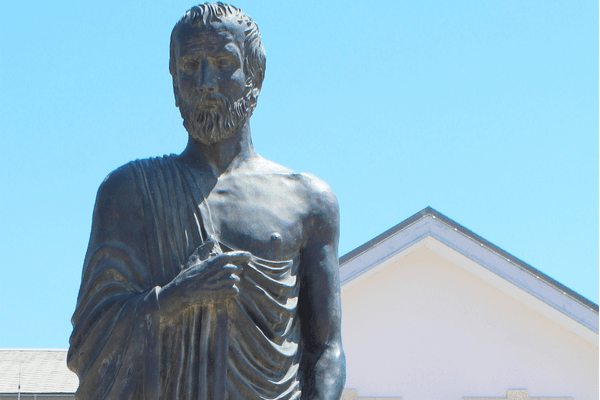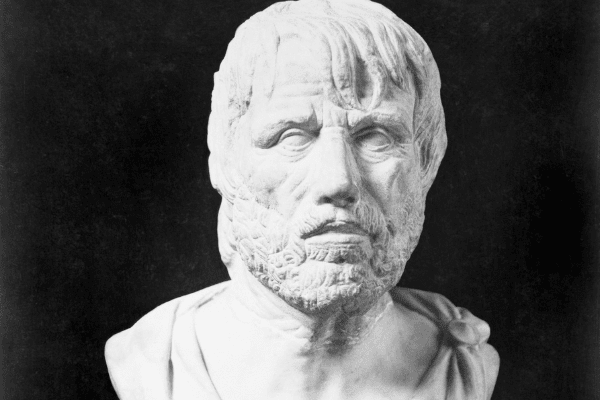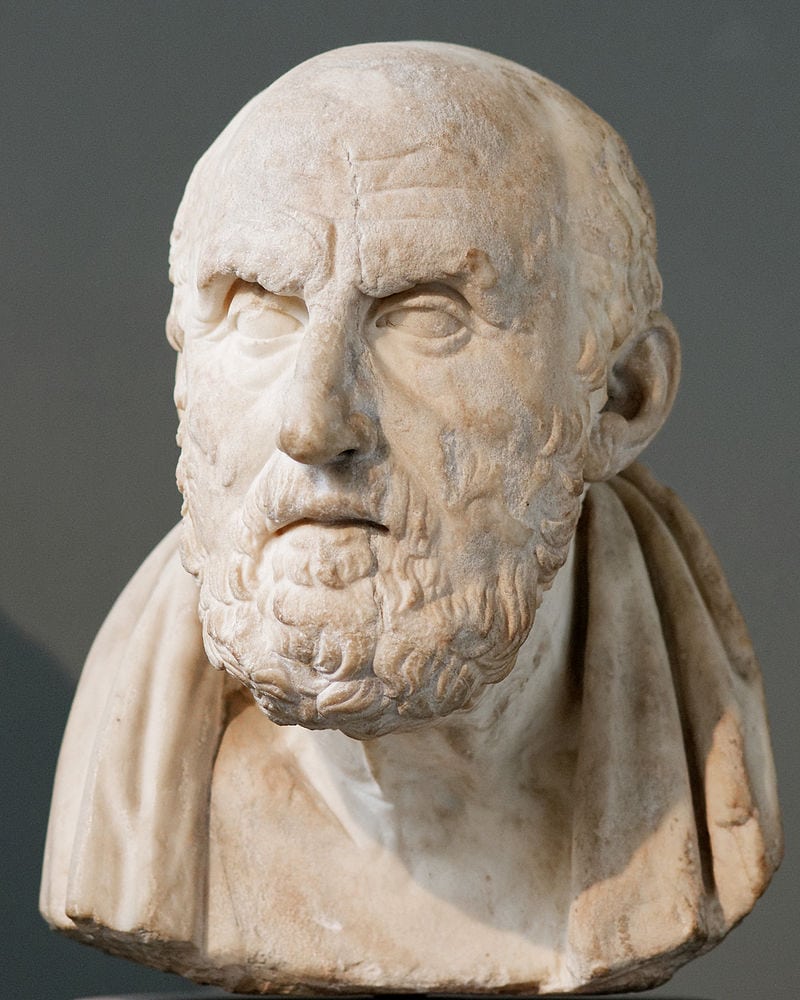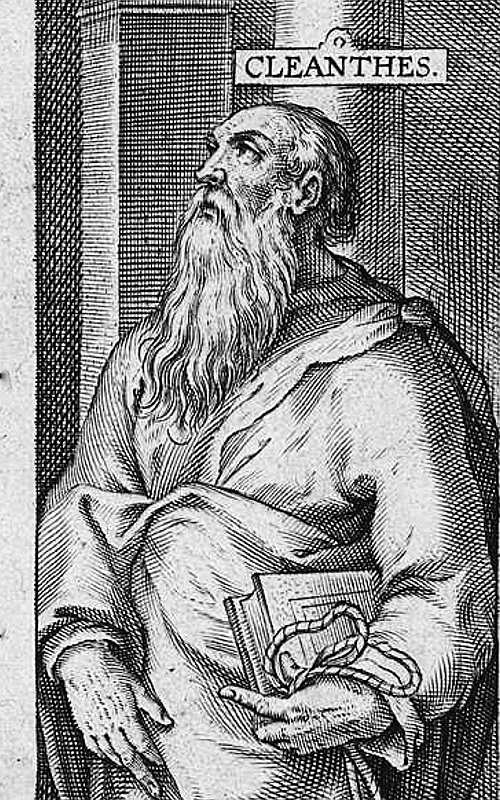
Originating in 300 BCE in Athens, stoicism is a school of philosophy that advocates for fortitude and self-control as aspects that lead to a virtuous life, happiness, and harmony with nature.
While stoics believe in fate, they also believe that humans have the freedom to use free will to create this harmony. They believe in the equality of all humans since we all originate from nature. In addition, stoicism states that in order to be ethical and virtuous, we must not attempt to control that which is not in our power and that we should use our free will to rid ourselves of envy, jealousy, and anger.
Generally speaking, stoicism is all about virtue and is guided by temperance, courage, wisdom, and justice as its main ideals. Stoic philosophy teaches that to achieve inner peace, which is an indication of harmony with nature, we need to avoid ignorance, evil, and unhappiness.
It’s important to note that while all stoics agree on the cardinal ideals stated above, their approaches differ, albeit minimally, and it’s these approaches that differentiate the greatest stoics ever known. Below are the most famous stoics and what they are known for.
Zeno Of Citium

Zeno is known as the founding father of stoicism. After a shipwreck robbed him of his merchandise, Zeno was guided to Athens in search of a better way to live. It was in Athens that he was introduced to the philosophy of Socrates and Crates, both of whom influenced him to start an outdoor school that taught sorely about “finding the good life” by living in accordance with virtue and nature.
Unlike other philosophers, Zeno chose to teach his message on a porch known as the Stoa Poikile, which is what later gave the Zenonians (the terms used to refer to his followers), the name Stoics.
Below are a few quotes that Zeno is known for:
- We have two ears and one mouth, so we should listen more than we say.
- All things are parts of one single system, which is called Nature; the individual life is good when it is in harmony with Nature.
- Steel your sensibilities, so that life shall hurt you as little as possible.
- Man seems to be deficient in nothing so much as he is in time.
- Happiness is a good flow of life.
- Man conquers the world by conquering himself.
- All things are parts of one single system, which is called Nature; the individual life is good when it is in harmony with Nature.
Marcus Aurelius

Marcus Aurelius is known for two things – for being one of the greatest Roman emperors that ever lived, and for his Meditations, which were daily assertations that he used to guide his rule.
At the time, Marcus was arguably the most powerful man in the world, and yet he kept himself grounded with stoic mantras. According to Marcus, the use of emotions in reaction to a crisis was irrational, instead, he advocated for the use of rational thinking and the practice of inner calm.
Even though his reign was afflicted with numerous trials, Aurelias ruled firmly and yet he did not let go of stoicism’s cardinal virtues – justice, courage, wisdom, and temperance. For this reason, he is termed the last of Rome’s five good emperors and his Meditations has greatly influenced politicians to this day.
Some of Aurelia’s meditations include the following thoughts:
- Choose not to be harmed—and you won’t feel harmed. Don’t feel harmed—and you haven’t been.
- The present is all that they can give up, since that is all you have, and what you do not have, you cannot lose.
- The things you think about determine the quality of your mind. Your soul takes on the color of your thoughts.
- If thou art pained by any external thing, it is not this that disturbs thee, but thy own judgment about it. And it is in thy power to wipe out this judgment now.
- A cucumber is bitter. Throw it away. There are briars on the road. Turn aside from them. This is enough. Do not add, “And why were such things made in the world?”
- Never regard something as doing you good if it makes you betray a trust or lose your sense of shame or makes you show hatred, suspicion, ill-will or hypocrisy, or a desire for things best done behind closed doors.
Epictetus

The most fascinating thing about Epictetus is that he was not born to power, but instead, he was born a slave to a rich stateman. By chance, he was allowed to study philosophy and he chose to pursue Stoicism.
Later on, he became a free man and went on to start a school in Greece. Here, Epictetus shunned material things and devoted himself to a simple lifestyle and to teaching Stoicism. His main lesson was that there is no need to complain or to worry about that which we can not control but rather accept it as the way of the universe. He also insisted that evil was not a part of human nature but rather a result of our ignorance.
Interestingly, throughout his teaching years, Epictetus never wrote down any of his teachings. It is one of his eager students, Arrian, that noted them done thus creating a diary that would become helpful to many powerful men and women including war heroes and emperors such as Marcus Aurelius. Some of his most memorable quotes include:
· It is impossible for a man to learn what he thinks he already knows
· To make the best of what is in our power, and take the rest as it occurs.
· No man is free who is not master of himself
· Let death and exile, and all other things which appear terrible, be daily before your eyes, but death chiefly; and you will never entertain any abject thought, nor too eagerly covet anything.
· Who is your master? Anyone who has control over things upon which you’ve set your heart, or over things which you seek to avoid.
· Circumstances don’t make the man, they only reveal him to himself.
Seneca the Younger

Seneca is known as the most controversial Stoic philosopher. Unlike those before him, he did not denounce a life of material property but rather amassed wealth for himself and rose politically to the point of becoming a senator.
In a turn of events, he was exiled on account of adultery but later recalled to become the teacher and advisor to Nero, who later became a notorious Roman emperor known for cruelty and tyranny. Later on, Seneca was falsely implicated in a plot to kill Nero, an event that saw Nero order Seneca to kill himself. It is this final event that cemented Seneca’s place as a Stoic. By practicing apatheia, he controlled his emotions and accepted his fate leading to his slitting his wrists and taking poison.
Throughout his controversial life and career, Seneca is known to have written numerous letters, which were collected to create the book, “On the Shortness of Life.” His letters insisted on the need not to worry about events outside our control. Of his quotes, the following are among the most famous:
· Believe me it is better to understand the balance sheet of one’s own life than of the corn trade.
· We are not given a short life but we make it short, and we are not ill-supplied but wasteful of it.
· Think your way through difficulties: harsh conditions can be softened, restricted ones can be widened, and heavy ones can weigh less on those who know how to bear them.
Chrysippus

Chrysippus is famously known as the second founder of Stoicism because he made the philosophy captivating to the Romans. According to Chrysippus, everything in the universe was determined by fate, yet human actions are capable of influencing events and consequences. Therefore, in order to achieve ataraxia (inner peace), we need to take complete control of our emotions, rational thinking, and reactions.
Chrysippus set on course a new age of Stoicism with these quotes:
· The universe itself is God and the universal outpouring of its soul.
· Wise people are in want of nothing, and yet need many things. On the other hand, nothing is needed by fools, for they do not understand how to use anything, but are in want of everything.
· There could be no justice unless there was also injustice; no courage, unless there was cowardice; no truth, unless there was falsehood.
· I myself think that the wise man meddles little or not at all in affairs and does his own things.
· If I followed the multitude, I should not have studied philosophy.
Cleanthes

After Zeno’s demise, Cleanthes succeeded him as the school leader and developed stoicism by unifying his ideas on logic, ethics, and metaphysics. What made Cleanthes’s teachings different is that rather than teaching about the control of emotions, he abolished them altogether. He stated that in order to achieve happiness, one had to strive for the consistency of reason and logic. This, according to Cleanthes, meant submitting to fate.
- He needs little who desires but little.
- He has his wish, whose wish can be to have what is enough.
- The Fates lead the willing but drag the unwilling.
- Lead me, Zeus, and you too, Destiny, to wherever your decrees have assigned me. I follow readily, but if I choose not, Wretched though I am, I must follow still. Fate guides the willing but drags the unwilling.
Diogenes of Babylon

Diogenes was known for his calm and modest speech. He headed the Stoic school in Athens and later was sent to Rome. His greatest achievement was introducing the ideas of Stoicism to Rome. From his many quotes, the following stand out:
- He has the most and is most content with the least.
- I know nothing, except the fact of my ignorance.
- Those who have virtue always in their mouths, and neglect it in practice, are like a harp, which emits a sound pleasing to others, while itself is insensible of the music.
Wrapping Up
From the given list, you’ll realize that the beauty of Stoicism is that it is not reserved for any particular class. Famous Stoics rage from emperors, through high-ranking officials all the way to a slave. The only requirement is that the teachings abide by the Stoic values. It is also important to note that the above listed are not the only Stoics known to history.
What we have listed are simply the most famous of them. There are other exemplary stoics who have given us quotes to abide by. All these together form a comprehensive list of wisdom to live by for anyone who is in pursuit of ultimate happiness.








